by lauenc | Feb 5, 2024
Hunting, when approached responsibly, can be a rewarding and educational experience for young individuals. As a 4-H agent dedicated to fostering a love for the outdoors, I recognize the importance of instilling a strong foundation of ethics and safety when introducing youth to the world of hunting. To ensure a positive and educational introduction to this amazing tradition, several key considerations should be considered.
- Safety Training and Ethical Hunting Practices:
The Florida Fish and Wildlife Conservation Commission (FWC) offers comprehensive safety resources, emphasizing the importance of proper firearm handling, wildlife identification, and safe hunting practices. Educating young hunters about the critical role of safety protocols ensures a secure and enjoyable experience in the field. There are a variety of hunter safety courses available. Visit the Which Hunter Safety Course Is Right For You? | FWC (myfwc.com) webpage to find out what course to see what may work best for your family. If you have completed an online course and have a certificate, you can participate in the upcoming Field Day on November 18, 2023 at West Pittman Baptist Church in Holmes County. Visit the Hunter Safety Registration (site.com) webpage to register or find other courses in your area on a different date.
- First Shot Fundamentals:
Holmes County 4-H has been awarded several grants from the The National Rifle Association (NRA) Foundation. Our Holmes County 4-H Shooting Sports Program includes archery, rifle, and shotgun disciplines. Youth members learn “first shot fundamentals” that will translate to important life skills as they may choose to ultimately participate in hunting opportunities. Emphasizing the values of fair chase, respect for wildlife, and the importance of humane and responsible harvesting helps instill a deep appreciation for the natural world and ecosystem.
- Conservation Education:
Collaborating with 4-H programs that incorporate conservation education can help young hunters understand the vital role they play in wildlife conservation and habitat preservation. Teaching the principles of sustainable hunting and the importance of maintaining ecological balance contributes to the development of environmentally conscious and responsible hunters. This also includes ongoing education and research related to Chronic Wasting Disease (CWD) in Holmes County and the surrounding region to learn what we, as hunters, can do to help.
- Mentorship Programs:
The Florida Fish & Wildlife Conservation Commission often organizes mentorship programs that pair experienced hunters with newcomers. These programs, align with 4-H’s emphasis on positive youth development and foster a supportive learning environment. Mentors follow the guidance outlined in mentorship materials to provide hands-on training, impart valuable skills, and promote the development of strong ethical values in young hunters. Visit the Mentored Hunts Registration (site.com) webpage to find upcoming opportunities across the state of Florida.
- Legal Compliance and Regulations:
The Florida Fish and Wildlife Conservation Commission (FWC) provides up-to-date information on hunting regulations, licensing requirements, and seasonal restrictions. Educating youth about these regulations instills a sense of responsibility and legal compliance, contributing to the cultivation of law-abiding and conscientious hunters.
By integrating these considerations into the process of introducing youth to hunting, we can ensure that they develop not only a passion for the sport, but also a respect for wildlife and the natural world. Together, we can foster the next generation of responsible and ethical hunters who prioritize safety, conservation, and ethical hunting practices in their outdoor adventures. For more information about how your youth can get involved with Holmes County 4-H, visit the Holmes County 4-H (holmescounty4h.com) webpage.
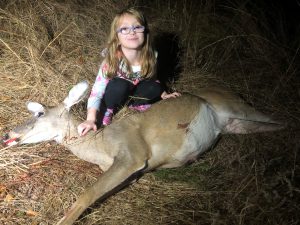
Miah, daughter of the Holmes 4-H Agent, enjoys the opportunity to harvest her first deer at age 6.
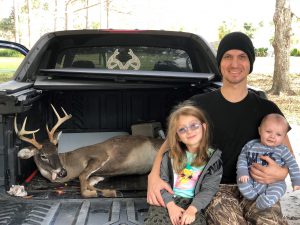
Holmes County 4-H Agent, Chris Lauen, introduces his children to a Holmes County whitetail buck.
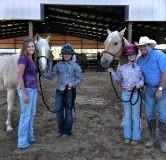
by Julie McMillian | Sep 25, 2020

A 4-H family gathered together at a show.
Are you looking for another way that you can aid your child in becoming a healthy well-adjusted adult? You help can them by allowing them to enter a relationship with a horse. Most kids are naturally drawn to horses and may benefit greatly in what they can gain from them. Some life skills learned from caring for equine are character building, healthy living, leadership skills, and responsibility, just to name a few. Plus, if your child is out at the barn caring for their horse, they are less likely to be stuck on their phones on the couch. Therefore, their physical health will benefit from doing chores and riding as well. Horseback riding offers many aerobic-exercise benefits such as building muscles, boosting balance, and increasing coordination and flexibility. Lifting saddles, water buckets, and cleaning require physical movement as well as gives a sense of self accomplishment of “I can do this all by myself.” When youth are responsible for the care of a horse, it teaches them to put others needs above their own and they learn empathy.
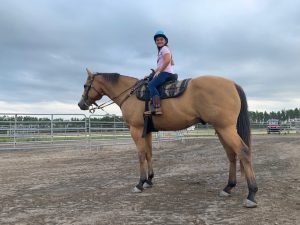
Emily, 4-H member, sitting on her horse, Slyder.
Did you know 4-H has a horse program? The goal of the program is to teach and provide young people with an opportunity to participate in activities that foster the love for the animal and achieve their goals. The activities are designed to improve citizenship, sportsmanship, horsemanship, character, competitive spirit, and discipline while making youth aware of life around them. When thinking about the 4-H horse program, there is the potential for participation in horse judging, public speaking, demonstrations, hippology and quiz bowl. Participation in these activities can help a youth improve in many areas to gain a better education and they don’t have to necessarily have a horse. There is also horse showing for those who own a horse. Showing equine will connect youth from all over the world as horse family while teaching them to prepare, build the courage to compete, enjoy the rewards and deal with disappointments. Hopefully, the disappointments will drive them to succeed and work harder while furthering their leadership skills. Afterall, taking control of a thousand-pound animal to work through challenging tasks will require skills that promote a child’s self-competence.
If you are looking for something new to spark an interest in your child, consider the 4-H equine project. Horses are fun, help teach great life skills, and kids adore them. They will keep youth positively engaged during their difficult years from pre-teen and into adulthood. If you are unsure of what your county has to offer in the way of equine 4-H programs, give your local UF IFAS County Extension Office a call and they will help you or connect you with someone in the field or visit http://florida4h.org.
*“Please note pictures were taken prior to our challenges with Covid-19 and we remind people to social distance and wear a mask for the personal safety of self and others.”
by bestevez | Jun 24, 2017
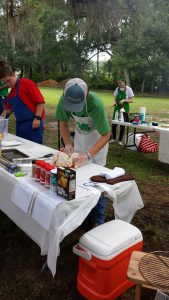
This contest teaches youth about meat science, food safety and communication skills.
Tailgating. The smell of charcoal in the air. Cooking over a hot grill. Earning lots of scholarship money?
The Florida 4-H Tailgate Contest completed its first year in 2016, giving out over $15,000 in scholarship money to 4-H members. This was made possible by sponsorships from Winn-Dixie, National Beef, and Sonny’s. In 2017, Sanderson Farms joins the list of sponsors for this statewide event.
While earning scholarship money is great, youth also learn many valuable life skills in the art of grilling. A curriculum series was developed (see below) to help youth learn about fire-building, meat selection, cooking safety, smoking and slow cooking meat, and cooking equipment. The Northwest District has been very proactive in hosting different tailgate and grilling day camps throughout the panhandle to further youth learning.
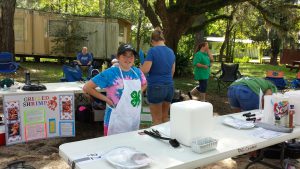
Youth demonstrate their knowledge during the district and state contests, and can win a college scholarship.
The Florida 4-H Tailgate Contest allows youth to grill two 6-8 ounce portions of one of the following proteins: beef, pork, poultry (half chicken or turkey breast), and headless, deveined, fresh shrimp. At each contest, judges will observe the food and fire safety of each participant and ask students questions about their recipe and safety knowledge. A team of judges will then evaluate the cooked product.
There are four contests hosted throughout the state including the South contest at 4-H Camp Cloverleaf, the Central contest in Dade City, the Northeast contest at the UF Horse Teaching Unit, and the Northwest contest held at the Washington County Fairgrounds. After youth compete at the local county contests/day camps, they can register for the district contest. The Northwest contest will be held on July 22, where the first place winner in each protein category receives $400, second place $250, third place $100, and fourth place $50. The top two winners from each protein area at the district contest are then eligible to compete in the state contest held at the University of Florida on October 14, 2017. For the state contest, the first place winner in each protein area receives a $1,500 college scholarship and the second place winner receives a $1,000 college scholarship.
We hope to see you at one of the many grilling opportunities offered throughout the Northwest District this summer through 4-H!
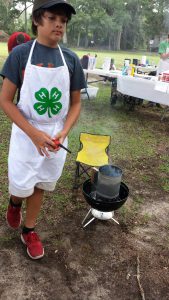 Day Camp Dates and Locations:
Day Camp Dates and Locations:
- June 5-9- Bay County Extension Office, Panama City, FL
- June 27-29-Holmes County Extension Office, Bonifay, FL
- June 27-29-Leon County Extension Office, Tallahassee, FL
- June 27-29-Liberty County Extension Office, Bristol, FL
- June 27-29-Washington County Extension Office, Chipley, FL
- July 5-6-Escambia County Extension Office, Cantonment, FL
- July 10-12-Walton County Extension Office, DeFuniak Springs, FL
Contact your local UF IFAS County Extension Office to inquire about other Florida 4-H Tailgating Day Camps and to register for the District Contest. For more information, visit these sites:
by Melanie Taylor | Apr 24, 2017
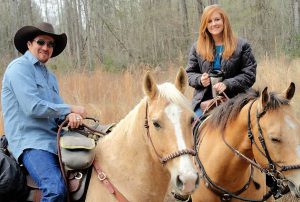
Russell and Julie McMillian, Gulf County 4-H Alumnae and 4-H Leaders
Russell and Julie McMillian both grew up in Gulf County and together have established a thriving business based on their love of horses. They now own a small farm in Dalkeith, just south of Wewahitchka, and their business Rockin’ M Ranch, consists of horseback riding lessons for beginners and beach rides for tourists and locals alike along the beautiful beaches of Cape San Blas.
How did this all begin? Russell and Julie both grew up as Gulf County 4-H members of the Big River Riders 4-H Club. They both participated in a variety of 4-H programs; including Horse Camp, Camp Timpoochee, Congress (now known as 4-H University), District Events, North Florida Fair Ag Judging, Area A and State 4-H Horse Shows, etc. They both learned the values of 4-H through learning how to raise and compete with their animals, agricultural commodities, leadership skills, public speaking, community service, good decision making skills, and much more…
As adults, they both went in separate directions, but still maintained their love of horses and the farm life. Russell began his career in flooring and tile work, while Julie received her education degree and taught Kindergarten at Wewahitchka Elementary School. After reconnecting as adults, they married on September 25, 2010 and turned their passion for horses into a full-time love by creating their own business, Rockin’ M Ranch. Russell still does flooring, tile work on the side, and helps his grandparents with their hay business. Julie decided to leave the teaching field, and she manages their business full time. She began giving beach rides on the Cape at the age of 14 and still loves it as much today.
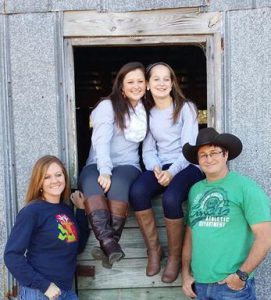
Julie and Russell McMillian pictured with Brooke (left) and Hayleigh (right).
Russell began his time with 4-H at the age of 12 and Julie was 8 years old. As members of the Big River Riders 4-H Club, they adored their 4-H leaders, Mr. Jesse Eubanks and Ms. Jean McMillian (Russell’s grandmother), and the Gulf County Extension Director, Roy L. Carter (now retired), whose passion for horses was contagious. Julie explained that she was a very shy child and that participating in public speaking for District Events really helped her come out of her shell. They both loved learning the values of the four H’s: Head, Heart, Hands, and Health. They feel 4-H has helped them develop into productive adults with good decision-making skills and in-stilled in them the importance of giving back to their community. They have served as 4-H volunteers for the Big River Rider’s 4-H Club since Russell’s daughters joined 4-H years ago; Brooke (17) and Hayleigh (15) also ride horses and have competed in a variety of Gulf County 4-H programs throughout the years. Russell and Julie have also taught a variety of horse riding classes at multiple Gulf County 4-H day camps.
As 4-H and community leaders, their most important goal is to give back to the community that gave to them as 4-Hers growing up here. They really love introducing new riders to the love of horses and 4-H. On any day, Russell and Julie can be found throughout the county at various events supporting 4-H members and any youth for that matter.
When asked what advice she has for someone thinking about becoming a 4-H volunteer she said, “Do not have regrets…just do it. Do not be scared off by the fingerprinting and application process. It is quick and easy, and maintains the safety for you and the children. Get started! 4-H is a great opportunity for youth and adults.”
“As a 4-H extension agent, you can only hope to find 4-H volunteers as dedicated as Russell and Julie McMillian. Their passion and love of 4-H is infectious and draws in youth looking for a place to belong.” -Melanie Taylor, Gulf County 4-H Agent
For more information about Rockin’ M Ranch, please go to http://www.therockinmranch.com/. For more information about how to become involved in 4-H, either as a youth member or adult volunteer, visit florida4h.org or contact your local UF IFAS County Extension Office. 4-H offers a variety of roles for volunteers to share their passions, skills and interests.
by amgranger | Mar 18, 2016
“When I was growing up 50 some years ago in West Gadsden County, I had no idea that the people that were a part of my everyday life would someday chart my path for the future.”
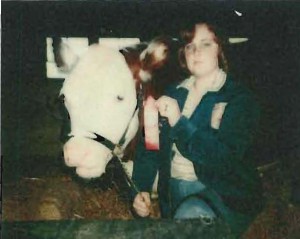
Angel (Clark) Granger showing her steer in Gadsden County, igniting a lifelong passion for 4-H.
I didn’t realize until recently just how deeply my roots are tied to 4-H. Not only does my family represent four generations of 4-H (with the addition of my granddaughter joining this year), but because there were people I took for granted that were absolutely engrained in Extension and 4-H.
I was the first child of Nelson and Karen Clark. I grew up on a farm raising cattle and goats. My grandmother was Ruby Scott Clark and everybody called me “Little Ruby” when I was growing up. She taught me how to string tobacco, garden, ride horses, drive a car, and how to make hoecake. My Granny’s best friend was Miss Elise Lafitte, County Home Demonstration Agent in Gadsden County during the 1950’s. She introduced my aunt, Shirley Clark, a now retired FCS Agent, to my uncle, Scott Clark. My cousin Bernard Clark was an Extension Agent in Gadsden County who is in the Florida 4-H Hall of Fame. My uncle Charles Rowan was an Ag Agent in Dixie and Pinellas Counties. If you read the chapter regarding Gadsden County in the book commemorating the 100 year Anniversary of 4-H in Florida, “Florida 4-H, A century of Youth Success”, you will see my Dad, my sons and me highlighted for our three generations of 4-H participation.
Growing up, I never tried to figure out what Extension was or why we had 4-H, it was just always there. My 4-H Agent growing up was Dickie Bentley. She made monthly visits to Greensboro Elementary School to teach us about record books and 4-H projects. I learned about veterinary science, public speaking, and how to give a demonstration. I still have every ribbon and pin I earned.
I left high school in the eleventh grade to help save the family farm from foreclosure. I soon married my husband Anthony and we moved to Tallahassee to work. In 1985 we bought 10 acres from my Dad, and we moved back home. In 1988 my second child, Cody was born. From the time they were old enough to tote a bucket, my husband and I worked the farm with my dad and taught our sons the value of life on the farm and family traditions.
I have a 4-H Exhibitor Card that was my Dad’s for ears of corn he entered as a 4-H Exhibit, as well as pictures of him showing cattle as a
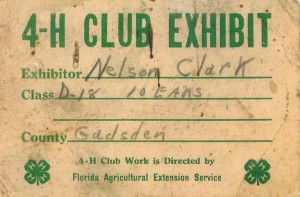
Angel still has her father’s 4-H exhibit card for corn he grew and exhibited at the fair. circa 1956
4-Her. He made sure that I had those same opportunities in 4-H. He bought steers, hogs and feed for me to show as a child, and later also for my oldest son Cole. He and proudly watched Cole work with and show his first steer in 1994.
Sadly, I lost my Dad three months later. He was only 54 and had spent his whole life trying to keep our farm going. I watched my Dad struggle every day, working as a barber, a school bus driver, and a farmer to make ends meet. He bought cheap cattle, made poor decisions regarding crops, nearly lost everything to bankruptcy and soybean disaster, but he never gave up. I vowed the day I buried my Dad that I was going to find a way to help other people like my Dad, I just never dreamed it would lead me into Extension.
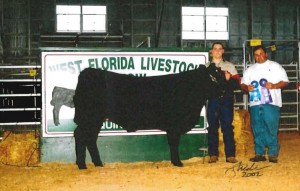
Angel’s sons, Cole and Cody Granger, also grew up in the 4-H family tradition and reply on many of the skills they learned in 4-H in their jobs as civil engineers.
After dad’s death, we continued what he started by keeping the boys in 4-H. I became the livestock club leader. My husband also volunteered to keep our boys active in 4-H showing cattle, hogs, and horses, and competing in county events until they both graduated high school. Both of my sons will tell you that 4-H played a huge role in making them the men they are today. They were part of clubs that had inclusive environments, they had opportunities to meet new people and were both able to use the skills they mastered to be successful in not only their college careers, but as professional engineers today.
After my sons finished high school and started college, I decided it was time to finish my education as well. Both of my sons graduated with degrees in Civil Engineering and I graduated with a degree in Agriculture with Emphasis in Animal Science. I had dreams of
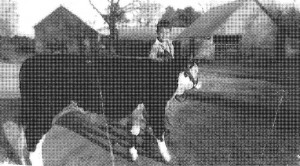
Nelson Clark showing a steer, circa late 1940’s/early 1950s
becoming an Extension Agent and working with farmers and families to help them make good decisions and have access to resources. After two years, I was hired as the 4-H Youth Development Agent in Jackson County (ironically my Granny was born and raised in Bascom, a small town in Jackson County). After a successful 32-year career with the Florida Department of State, I set out on another exciting 4-H journey. Every day I strive to honor the memory of my Dad (who would have been 76 years old this month), my Granny, and my other family members who have been part of the legacy of Extension. Most importantly, I strive to make a difference in a young person’s life just like my 4-H Agent did.
Are you part of a 4-H family tradition? If not, consider starting one today. 4-H offers a broad spectrum of projects and activities to serve a variety of interests, skills, and knowledge. Contact your local UF IFAS Extension office or visit http://florida4h.org to enroll as a youth member or adult volunteer!













